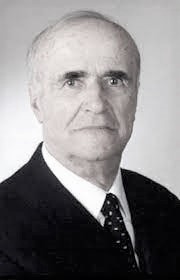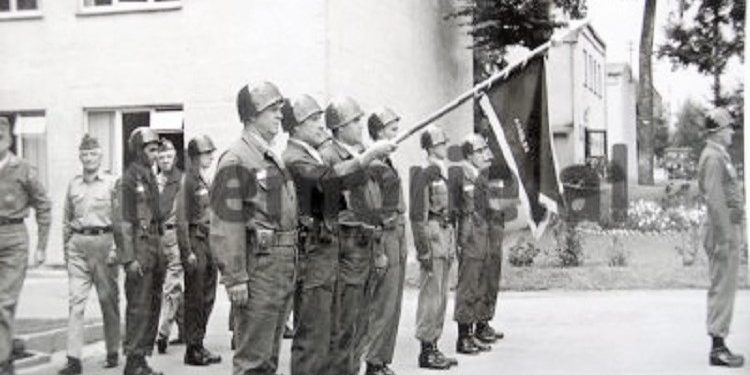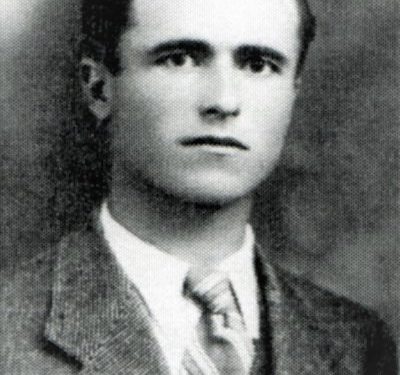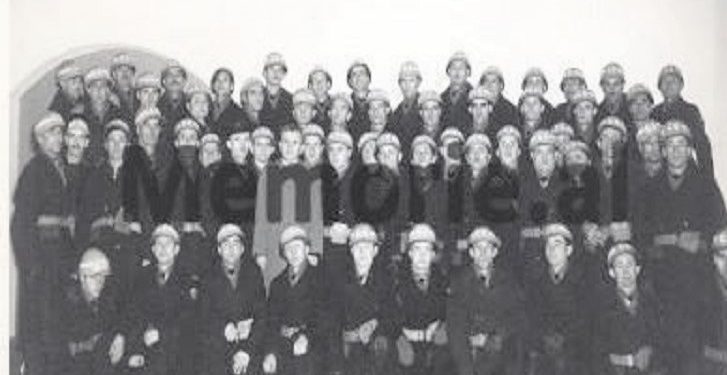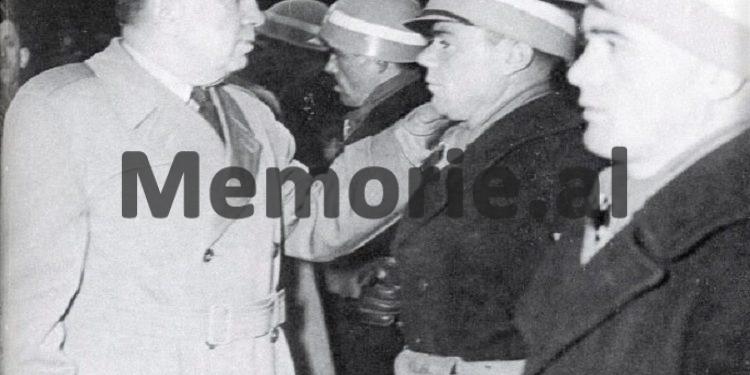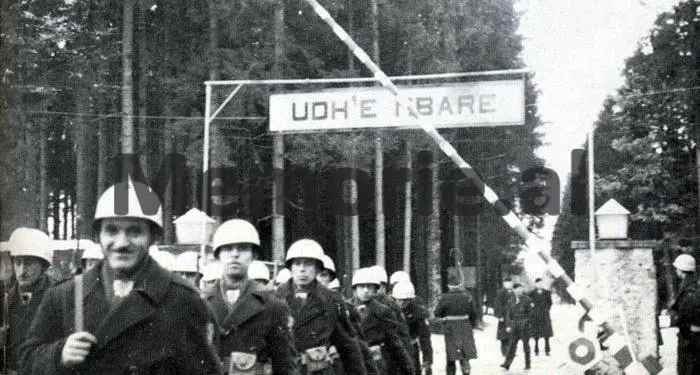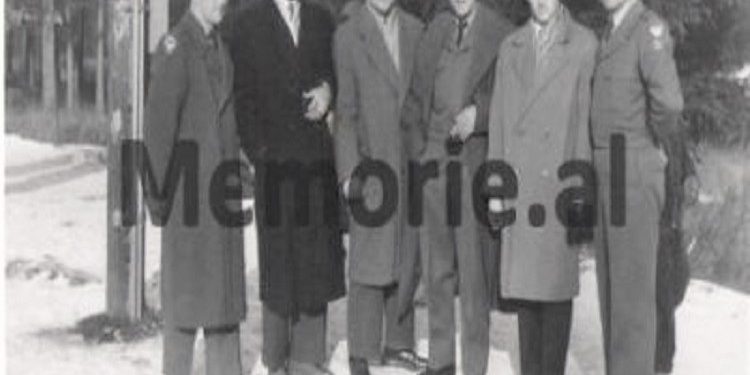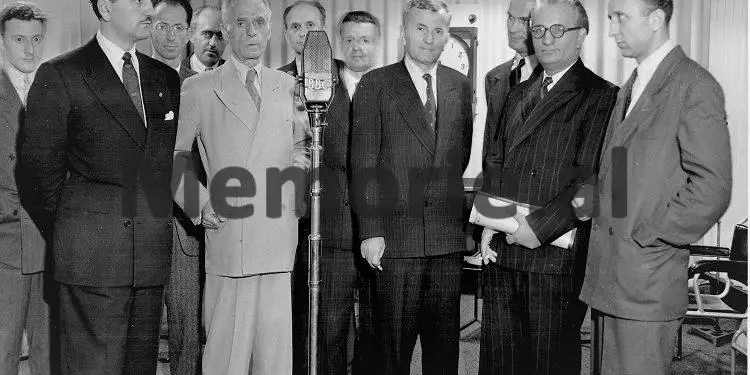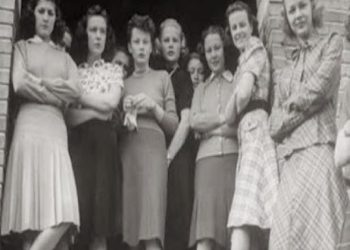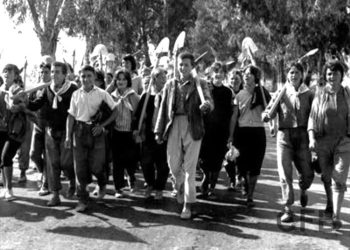Second part
Memorie.al / Abas Ermenji (1913-2003) was a political figure and anti-fascist resistance fighter during the Second World War. He was born in Skrapar and after being educated in Berat and Shkodër, he earned a right to study in France, where he attended higher studies at the Sorbonne University in 1934-1938, where he graduated in History. After returning to Albania in 1938, he was appointed as a lecturer at the Korça High School and in November 1939, for his anti-fascist activity (which he had openly demonstrated since April ’39), when he appeared in at the forefront of demonstrations against the fascist occupation, he was arrested by the Italians in Greece, when he was trying to assemble a fighting force, of Albanian internees, and was held in exile on the island of Ventotene in Italy, until 1941. On his second return in Albania, he became a leading figure of the Anti-Fascist Resistance Movement, as one of the main leaders of the nationalist organization “Balli Kombëtar” and with his armed forces; he took an active part in the battles for the liberation of the city of Berat, from Italian invasion. Ermenji was also an ardent anti-communist and when Enver Hoxha’s partisans came down from the mountains and took power in Albania, he fled to Greece (1946-1947) and then to Paris, where in August 1954, together with Vasil Andon, founded the National Democratic Anti-Communist Committee for Free Albania (“Free Albania”), which included many elements with nationalist tendencies who were in exile. Ermenji returned to Albania in 1991 when the communist regime collapsed and when “Balli Kombëtar” was re-founded and he led the party in the 90s. In the period 1949-1951, at the height of the Cold War, Abbas Ermenji was involved in the efforts of the Anglo-Americans to overthrow the communist regime of Enver Hoxha in Albania. He describes his involvement in the botched operation in the following two interviews with Lord Nicholas Bethell (1938-2007), author of The Great Betrayal: The Untold Story of Kim Philby’s Biggest Heist (London 1984).
Abaz Ermenji’s statement to the English Lord, Nicholas Bethell, in Paris on April 15, 1983 and July 23, 1983
Continues from last issue
I came to London that summer and met members of the British and American intelligence services. I told them that either we must act seriously and liberate Albania, with a significant number of human forces, or we must cancel the operation in the interest of saving people’s lives.
They listened to me and begged me to go to Malta once more. So I went there in September 1951. I would not give my authority to send any other group into the country. I think they made another group without me, with the help of Ihsan Toptan.
Michael Burke was very intelligent and understanding, but after him Joe Leib was a disaster. And the secretary of the executive committee, who was also the secretary of the Zogist Movement, was an idiot, almost more idiot than Leib. I once went to the training school (Company 4000), in Germany.
It was a large, secluded house with a park. Mangelly was a man in his 30s, with a wife and a son. His parents had come to America from Albania. And I went to Hohenbrunn once, to calm people down about the incident of the Bird’s Grave in the Snow. It was nonsense that was threatening to become a battle between the two sides.
Everything that Leib and Gaqo Gogo decided became known to the communist embassy in Rome. Gogo was talking about it in the café. The Communists had agents among the Zogists, especially a certain Rr. B. It was not only the Albanian embassy, but also the Soviet and Yugoslav embassies. And then there was Philby on the British side. Gogo knew all these details in advance, the dates and places of landings and told Rr.B. of others.
He was paid very well by Leib and spent every evening at the ‘Casino delle Rose’ with his lover. He dressed very tastefully and went everywhere by taxi. He lived in a very nice apartment in Rome. I did not see Leib more than two or three times. I saw at once that he was an insignificant man. When he wanted to see me, I usually sent Andon or Zef Pal and they made an excuse why I couldn’t be there.
Ernest Koliqi and Vërlaci were the main pro-fascists who came to the Committee, with Xhafer Deva, who was the German Minister of the Interior and Gestapo agent, Hasan Dosti, a miserable fellow. He intrigued with the birders and the Americans knew that Dosti would do anything they asked of him. Dosti was a weak type, who could never impress people who were stronger than him.
It wasn’t about money with him, although it probably was with others. We had nothing against him being the minister of the fascists, of Mustafa Kruja. This at a time when the Italians were in favor of the colonization of Albania, with Arbëresh people of Albanian origin, immigrated to Italy. Dosti found a pretext to become Minister of Justice in the proposed government to oppose this. He sacrificed himself for a good cause. He had Frashëri’s approval for this.
McLean and Amery were in Rome during the summer of 1949, but they did not participate in the discussions that formed the “Free Albania” Committee. I was contacted by McLean and Amery in Athens in May 1949. I was the only leader of the ‘National Front’ there at that time. I lived in a flat, but the Greeks held me hostage.
We talked about the expulsion of Yugoslavia, from COMINFORM and they told me that Albania had become a country without protection, that there had been a “vacuum” between Yugoslavia and Greece. We all thought it was possible that Greece and Yugoslavia would take military action against Albania.
However, they said, the American and British authorities were against it. They suggested that it was wrong to leave a vacuum there. This was the reason why an Albanian action was necessary to protect Albania’s interests, to limit Greek and Yugoslav ambitions.
The idea of liberating Albania from the communists went parallel to this. Albania would become a country capable of resisting its two neighbors, naturally as a member of the Western camp. Amery and McLean, told me that I was the only person who could take such an initiative and make it better. They knew my popularity among young Albanians.
They did not tell me that at the same time the Americans were making contact with Mid’hat Frashëri in Istanbul and that of course some other allied personalities had spoken with King Zog in Cairo. I agreed in principle, but I told them that I could not take the main role, because we were a political party and the chairman of the party was Mid’hat Frashëri.
At that stage there was no mention of the Royals, (birders) taking part, nor Frashëri in Istanbul, the first mention of them was in Rome, at the end of May or at the beginning of June.
I accepted the participation of the Royals, not because they meant anything inside Albania, but because of the outside world, which knew Albania only as the Kingdom of the Bird. We could not convince the outside world that Zogu was nothing in Albania anymore.
The British and the Americans took me to Trieste. But later they realized that Frashëri would not enter into any agreement without me. Then they came to Trieste and spoke threateningly to me. If I continued the opposition, they said, they would abandon the fate of Albania and hand it over to the Greeks and Yugoslavs.
They took me to Trieste, partly because it was a city under international control and they wanted to protect me from the Italians, who would come out to arrest me every day, partly to put pressure on me to go along with what they wanted. They thought it would be easier to manipulate others if I was away from Rome.
But others wouldn’t make a decision without me. When the British continued to threaten, I said that if necessary, I would knock on the door of the first Soviet embassy I could find to save Albania. The Soviets are intelligent, I told them, and they know what our party stands for.
However, the conversation with them ended in peace and laughter. I called Frashëri in Rome and advised him to accept the proposal of a presidency, of which I would also be a part. Then, after the agreement, I was asked to come and meet the Italian governor of Trieste.
He received me very well, gave me regular documents with a residence permit, then I was taken by car to Udine and then by American military plane, to Rome. This was in early August, about three weeks before the announcement of the “Free Albania” Committee in Paris on August 26.
I wanted our backers to give us the means to train a small and well-equipped army, also to land them in Albania and supply them by air. This would allow us to create centers of resistance and then raise the population against the communist government headed by Enver Hoxha and Mehmet Shehu.
The people would be on our side immediately and the units of the Albanian army would have joined us. That was our information. No one at that time thought that Enver Hoxha’s communist regime in Albania would survive. It was certainly the most favorable moment to overthrow him.
A colonel of the Albanian army in Gjirokastër told one of our agents that he and many others were prepared to move, provided we sent a significant force and parachuted the necessary equipment. So there were some positive indications as a result of the first landings from Malta.
All this information came from groups trained by the British. We got almost nothing from the groups trained by the Americans, who almost all disappeared.
We also learned that somewhere off the coast of Ishmi, (north of Durrës), there was a Soviet submarine base, as well as the main base on the island of Sazan. These results were not discouraging, but what was discouraging was the attitude of the British and Americans, their lack of will, to undertake a large-scale operation.
It was a “pot” that could not be boiled in a small flame. It was not possible in Albanian conditions to gather groups of people and create teams of five or six people. The controls were very tight.
Also the British and the Americans hesitated for a long time. This allowed other countries, notably Yugoslavia and Greece, to prepare and send their own agents. And all this confused the Albanian people.
They could understand and accept an operation organized by the Albanians, under the support of the British or the Americans, but who were these agents of Greece and Yugoslavia, the two countries that wanted to destroy us? So, after these first attempts, we told our supporters that liberation was a practical possibility, but only with serious forces.
The Americans used less sophisticated tools than the British. And they had to deal with the Bird royals. And there were leaks on the Royal side, as domestically, there was a strong police force and a terrorized population. That’s why everything failed.
The main massacre was in 1954. After the trial of Zenel Shehu and Hami Matjani, the communists executed and killed about 400 people, in the region of Mati, with and without trial. First, the families of those convicted in the trial were shot. Then there were the people with whom Zeneli and others had to contact. Zeneli gave the communists all their names, after being held under inhumane torture.
Then, when these people were arrested, they implicated other people, also under torture, often people who were not involved in any way in any activity against the communist regime. They would do anything to stop the torture. Such bloodshed would never have happened if our party had been involved, but 400 Albanians, more or less, it was something that Zogu did not care about. Memorie.al




